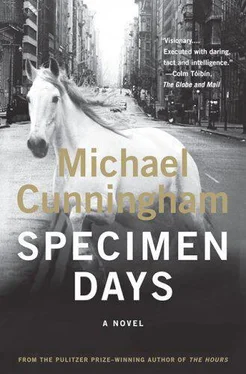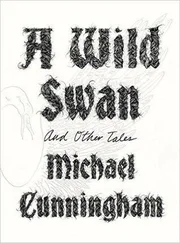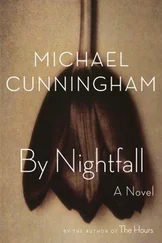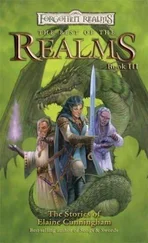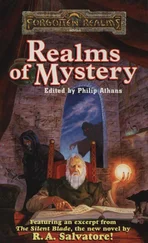Michael Cunningham - Specimen Days
Здесь есть возможность читать онлайн «Michael Cunningham - Specimen Days» — ознакомительный отрывок электронной книги совершенно бесплатно, а после прочтения отрывка купить полную версию. В некоторых случаях можно слушать аудио, скачать через торрент в формате fb2 и присутствует краткое содержание. Город: New York, Год выпуска: 2005, ISBN: 2005, Издательство: Farrar, Straus and Giroux, Жанр: Современная проза, на английском языке. Описание произведения, (предисловие) а так же отзывы посетителей доступны на портале библиотеки ЛибКат.
- Название:Specimen Days
- Автор:
- Издательство:Farrar, Straus and Giroux
- Жанр:
- Год:2005
- Город:New York
- ISBN:0-374-70515-1
- Рейтинг книги:4 / 5. Голосов: 1
-
Избранное:Добавить в избранное
- Отзывы:
-
Ваша оценка:
- 80
- 1
- 2
- 3
- 4
- 5
Specimen Days: краткое содержание, описание и аннотация
Предлагаем к чтению аннотацию, описание, краткое содержание или предисловие (зависит от того, что написал сам автор книги «Specimen Days»). Если вы не нашли необходимую информацию о книге — напишите в комментариях, мы постараемся отыскать её.
Specimen Days — читать онлайн ознакомительный отрывок
Ниже представлен текст книги, разбитый по страницам. Система сохранения места последней прочитанной страницы, позволяет с удобством читать онлайн бесплатно книгу «Specimen Days», без необходимости каждый раз заново искать на чём Вы остановились. Поставьте закладку, и сможете в любой момент перейти на страницу, на которой закончили чтение.
Интервал:
Закладка:
“Apart from all that money,” Cat said.
“Right. But it’s real estate. He didn’t have sweatshops. His employees didn’t love him, but they didn’t hate him, either. They got their salaries. They got their benefits. They got Christmas bonuses every year, plus a party at the Rihga Royal.”
“In my experience,” Cat said, “very few rich people have no enemies.”
“His enemies were all on his level. Basic business rivalries, guys he outbid, guys he undersold. But these people didn’t hate him. It doesn’t work that way. It’s a club. Dick Harte was one of the less sleazy members.”
“What about the son who had to be sent away to school in Vermont?”
“Just a troubled kid. Got into drugs, grades started slipping. Mom and Dad shipped him off to the country. I’m sure they weren’t happy about it, but it doesn’t seem like any big deal.”
“What was Dick Harte up to at Ground Zero?” Cat asked.
“He was one of a group of honchos pushing for more retail and office space in the rebuild. As opposed to those who favor a memorial and a park.”
“That might be a big deal to any number of people,” Cat said.
“But to a ten-year-old?”
“This is a ten-year-old who’s memorized Leaves of Grass."
“A freak,” Ed added.
“Or maybe a savant,” Cat said.
“The one doesn’t necessarily rule out the other,” Pete said.
“No,” Cat answered. “It doesn’t.”
She spent the morning waiting in her cubicle, hoping for another call. Who were the great waiters in literature?
Penelope waiting for Odysseus, undoing her weaving every night
Rapunzel, in her tower
Snow White, Sleeping Beauty, and all the other comatose princesses.
She couldn’t think of any stories about men whose job it was to wait. But as Ed had put it, Hey, don’t get all Angela Davis on me. She’d do her best.
She listened to the tape, several times. She looked through Leaves of Grass.
They prepare for death, yet are they not the finish, but
rather the outset,
They bring none to his or her terminus or to be
content and full,
Whom they take they take into space to behold the
birth of stars, to learn one of the meanings,
To launch off with absolute faith, to sweep through the
ceaseless rings and never be quiet again.
Little boy. Who do you want to take into space to behold the birth of stars?
At ten-thirty, she tossed her cell into her bag and went over to Rita Dunn’s office at NYU. Dunn was in a building on Waverly. One of these buildings, Cat had never been quite sure which, had been that sweatshop, where the fire was. She knew the story only vaguely the exits had been blocked to keep the workers from sneaking out early. Something like that. There’d been a fire, and all those women were trapped inside. Some of them had jumped. From one of these buildings was it the one she was entering? women with their dresses on fire had fallen, had hit this pavement right here or the pavement just down the street. Now it was all NYU. Now it was students and shoppers, a coffeehouse and a bookstore that sold NYU sweatshirts.
Cat went up to the ninth floor and announced herself to the department secretary, who nodded her down the hall.
Rita Dunn turned out to be red-haired, mid-forties, wearing a green silk jacket and heavy makeup. Dark eyeliner, blush expertly applied. Around her neck, a strand of amber beads just slightly smaller than billiard balls. She looked more like a retired figure skater than she did like a professor of literature.
“Hello,” Cat said. She gave Rita Dunn a moment to adjust. No one ever said, You didn’t sound black over the phone. Everybody thought it.
“Hello,” Rita responded, and pumped Cat’s hand enthusiastically. People loved talking to cops when they weren’t in trouble.
“Thanks for taking the time to see me.”
“Glad to. Sit.”
She gestured Cat into a squeaky leatherette chair across from her desk, seated herself behind the desk. Her office was a chaos of books and papers (disorderly sister). On the wall behind her, a poster of Whitman great lightbulb of old-man nose, small dark eyes looking out from the cottony crackle of beard and hair. In the window of Rita Dunn’s office, a spider plant dangled its fronds before the vista of Washington Square Park. Had seamstresses once huddled at that window, trapped by flames? Had they stood on that sill and jumped?
“So,” Rita Dunn said. “You want to know a thing or two about Mr. Whitman.”
“I do.”
“May I ask what exactly you’re looking for?”
“Relating to a case I’m investigating.”
“Does it have to do with the explosion?”
“I’m sorry, I can’t discuss the details.”
“I understand. A case involving Walt Whitman. Is he in trouble?”
“I know it’s unusual.”
Rita Dunn steepled her fingers, touched them to her mahogany-red lips. Cat felt, abruptly, the force of her attention. It was palpable, a clicking-on, a jewel-like zap that rose in her perfectly outlined eyes. Right, Cat thought. You dress like this to fool the men, don’t you? You’re a stealth fighter.
“I like the unusual,” Rita said. “I like it very much. Can you give me a hint about where to begin?”
“Let’s say this. Could you give me some idea about Whitman’s message to his readers?”
“His message was complicated.”
“Got that. Just tell me whatever comes to mind.”
“Hm. Do you know anything about him at all?”
“A little. I read him in college. I’ve been reading him again.”
“Well. Okay. Whitman as you probably know was the first great American visionary poet. He didn’t just celebrate himself. He celebrated everybody and everything.”
“Right.”
“He spent his life, and it was a long life, extending and revising Leaves of Grass. He published it himself. The first edition appeared in 1855. There were nine editions in all. The last, which he called his deathbed edition, appeared in 1891. You could say that he was writing the poem that was the United States.”
“Which he loved.”
“Which he did love.”
“Would you call him patriotic, then?”
“It’s not quite the right term for Whitman, I don’t think. Homer loved Greece, but does the word ‘patriotic’ feel right for him? I think not. A great poet is never anything quite so provincial.”
She picked up a pearl-handled letter opener, ran a fingertip along the blade. Aristocrats with tentative claims to thrones might have been just this impeccably overdressed, Cat thought. They might have possessed this underlayer of fierce, cordial vigilance.
Cat said, “But might someone, reading him today, interpret him as patriotic? Could Leaves of Grass be read as some sort of extended national anthem?”
“Well, you wouldn’t believe some of the interpretations I’ve heard. But really, Whitman was an ecstatic. He was a dervish of sorts. Patriotism, don’t you think, implies a certain fixed notion of right versus wrong. Whitman simply loved what was"
“Indiscriminately.”
“Yes and no. He believed in destiny. He imagined that the redwood tree was glad for the ax because it was the tree’s destiny to be cut down.”
“So he had no particular sense of good and evil.”
“He understood life to be transitory. He was not particularly concerned about mortality.”
“Right,” Cat said. “Is that helpful?”
“Mm-hm. Does the phrase ‘In the family’ mean anything to you?”
“Do you mean, do I recognize it from Whitman?”
Читать дальшеИнтервал:
Закладка:
Похожие книги на «Specimen Days»
Представляем Вашему вниманию похожие книги на «Specimen Days» списком для выбора. Мы отобрали схожую по названию и смыслу литературу в надежде предоставить читателям больше вариантов отыскать новые, интересные, ещё непрочитанные произведения.
Обсуждение, отзывы о книге «Specimen Days» и просто собственные мнения читателей. Оставьте ваши комментарии, напишите, что Вы думаете о произведении, его смысле или главных героях. Укажите что конкретно понравилось, а что нет, и почему Вы так считаете.
